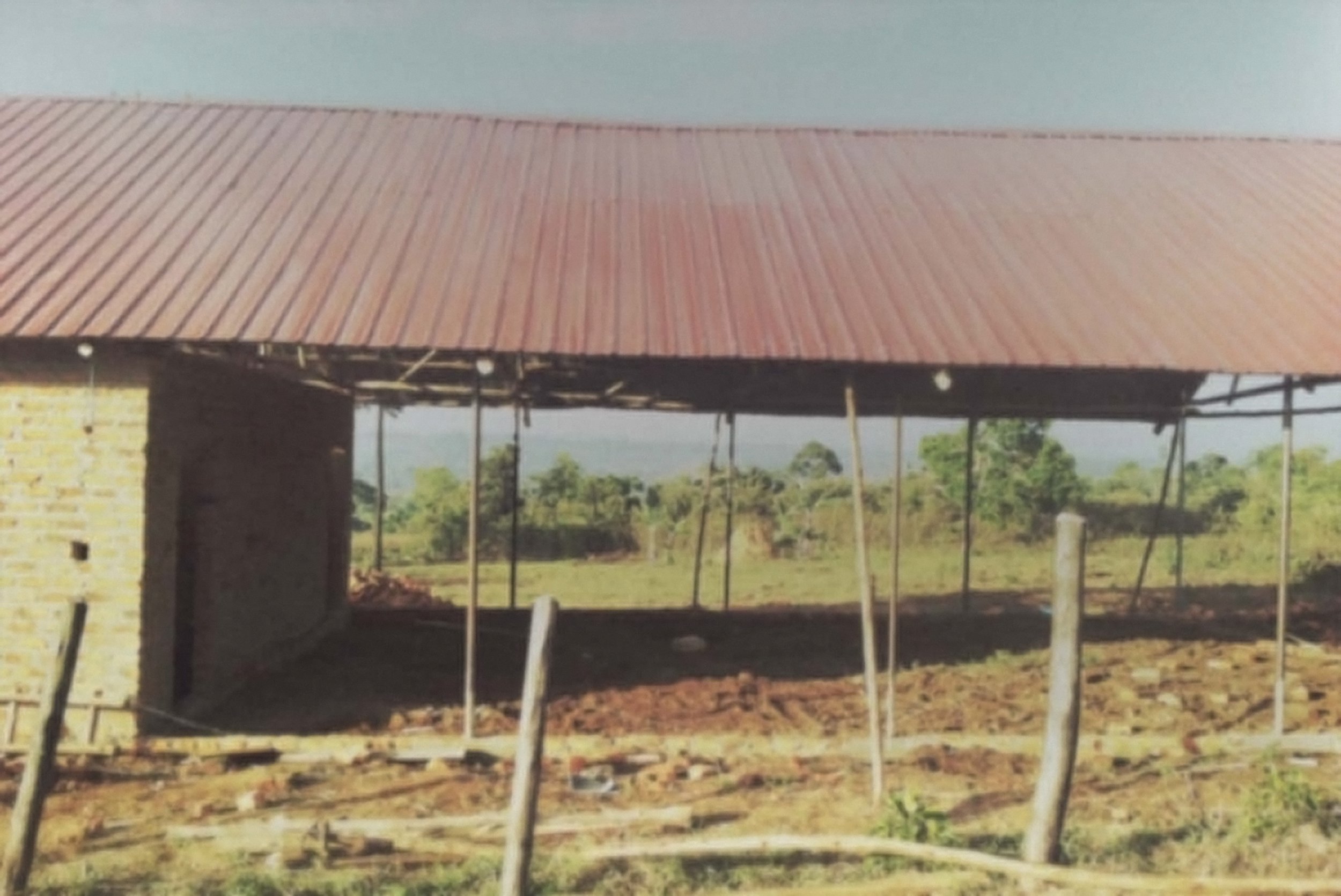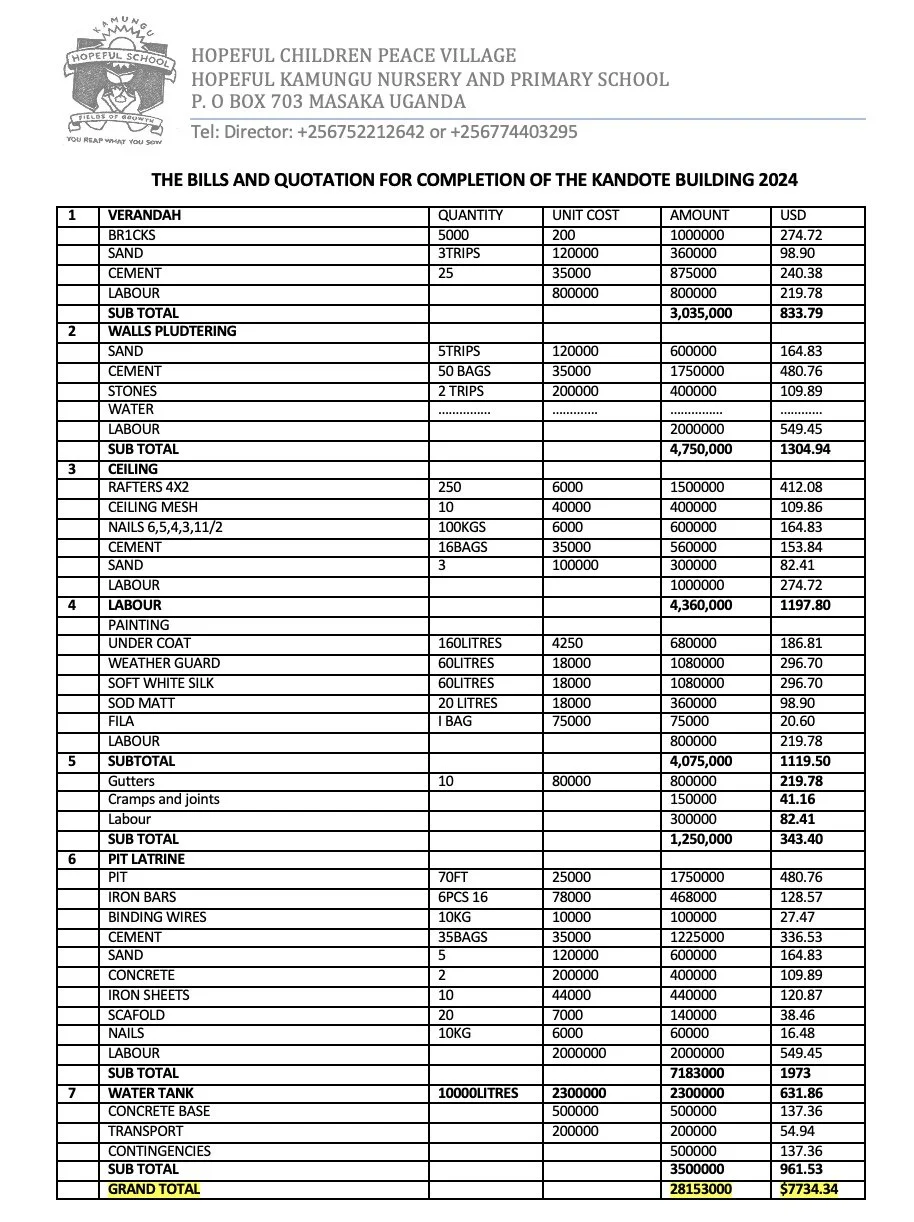
THE KANDOTE PROJECT IS AN ONGOING COLLABORATION WITH THE HOPEFUL KAMUNGU PRIMARY SCHOOL OF KKINDU, UGANDA.
JUNE 2025 UPDATE: Kandote - Together As One, our second album with the Hopeful School Choir, is finished and we can’t wait to share it with you soon. More TBA.
Kandote (KAHN-doh-tey), our very first record (purchase / stream), is a collaboration with the Hopeful Kamungu School of Kkindu Village, Uganda. It is a not-for-profit that has put resources directly back into the Hopeful School Choir’s education, through a product of their own hand—or rather, voice.
Since 2012, the Kandote Project has funded portions of the Hopeful Kamungu School’s musical training, equipment, and a dormitory/music space through album sales and generous contributions from the FLA community. Listen below to a message from John Kakande, the project’s local fiduciary, and Director of the Hopeful Kamungu School.
The concept for the project began in Fall 2011 when our friend and fellow social concerns activist, Kevin Dugan, invited us to come to Uganda. Dugan, founder of the NGO Fields of Growth International (FoG), encouraged us to explore the musical potential of a young troupe of singers from the Hopeful Kamungu School, located in Kkindu Village, a very small community (population ~700) in the Masaka Region of Uganda. After many contributions from friends and family, grants from University of Notre Dame’s ISLA and CUSE, a brief passport scare, and plenty of medical errands, we packed our bags (not the lightest of which contained a hefty field-recording rig) and left for East Africa in January 2012. We were greeted by the warm, witty, and ultra-hospitable hosts of Maurice Sserunkuma, Andrew Musambi, Sam Otoa, and John Kakande, and for the next two weeks, were blessed to begin the collaboration of a lifetime.
The choir, who at the time called themselves “The Barefoot Truth Children’s Choir” were an incredibly well-behaved, patient, and engaged group of youngsters, which made working with them nothing less than an honor and privilege. (January 2024 update: The choir is now called the Hopeful School Children’s Choir, and is currently led by John Vianney, one of the original members of the 2012 Kandote recording sessions! He was 12 years old then.)
After collecting about as much material as our computers could hold, we said our farewells and headed back home, although a portion of our hearts now permanently resides in the Pearl of Africa. The remainder of the Kandote EP was recorded and produced in Nicholas’s home studio in South Bend, Indiana, mostly throughout the summer of 2012.
Fast forward to January 2024, Brian's cousin, Joe, was able to visit Kkindu to meet John Kakande, John Vianney, and the current choir. Joe recorded this video while he was there, which provides an overview of the Hopeful Kamungu School's grounds and an update on developments in progress.
What we learned from Joe’s January 2024 visit: The Kandote Building, (see video above and picture below) originally a music pavilion, has been converted into a dorm to house students who travel to attend the Hopeful Kamungu School and participate in the choir. To finish the Kandote Building, our friends in Kkindu needed $7,734.34 USD. The below table shows the cost breakdown to complete the unfinished parts of the building. (June 2025 update: We are now $5062 away from completion.)
Above: John Kakande, Director of the Hopeful Kamungu School, inside the Kandote Building’s dormitory. (January 2024)
Above: Cost breakdown to complete the Kandote Building. (January 2024)
If you’ve enjoyed our Kandote album, please consider helping us finance the completion of the Kandote Building. (NOTE: Contributions are NOT tax deductible, as Frances Luke Accord is NOT a 501c3.) You can do so via PayPal, Venmo, or check:
NOTE: For checks, please email us at FLA@franceslukeaccord.com for mailing details.
As we've done since the beginning, Brian (who has a master's degree in nonprofit management and runs the homelessness-focused nonprofit, Neighborhood Hands, by day) will wire funds directly to the Hopeful Kamungu School, with John Kakande as the fiduciary. We have a close working relationship with John, and 100% trust in his leadership and administrative capabilities.
What if FLA raises more than $7734.34? If YOU, our beloved fanbase and community, blow this goal out of the water, additional revenue will be allocated the same way Kandote revenue has always been allocated: by investing it back into the educational and musical well-being of the choir with the help and direction of John Kakande.
From deep down, thank you for listening to this collaboration and supporting the Kandote Project over the last decade. It's means the world to us. For all your support, webale! (Luganda for “thank you.”)
- Brian & Nick
Facts and FAQ:
“Kandote” is Luganda for “and I dream.” The chorus in the title track translates to “and I dream of being one, together, for we are one blood.” The lyrics were written by our dear friend, Andrew Musambi, to a melody Brian wrote the night before our first recording session with the choir.
The choir consisted of 28 kids between the ages of 8 and 15, with 4 choir directors and sometimes many, many percussionists (for some of our performances, the instrumental ensemble consisted of about two dozen players, which, we were told, was actually rather small).
Although English is an official national language of Uganda, very few people in the village spoke it fluently. Instead, they spoke the other major language of the country: Luganda. This made communication between us and the choir difficult at times. One of our guides, Andrew, along with the head of the village, John Kakande, served as our primary translators.
Wasswa and Kato (the title of the last song on the album) were twin boys that we were particularly fond of (to see pictures of them, click here). In the Southwest region of the country where we stayed, it is tradition that all twin boys are named Wasswa and Kato, with Wasswa being the older of the two.
Kkindu Village, where the choir was recorded, is in the Masaka region of Uganda, located ~3 hours southwest of Kampala.
Other contributors to the Kandote EP: Christian Rougeau, violin, “In the Water,” “Kandote,” and “Wasswa and Kato.” Lucy Lavely and Tess Gunty, vocals, “Swing Low.” The other crowd heard in the third chorus of “Kandote” is Brian’s family.


